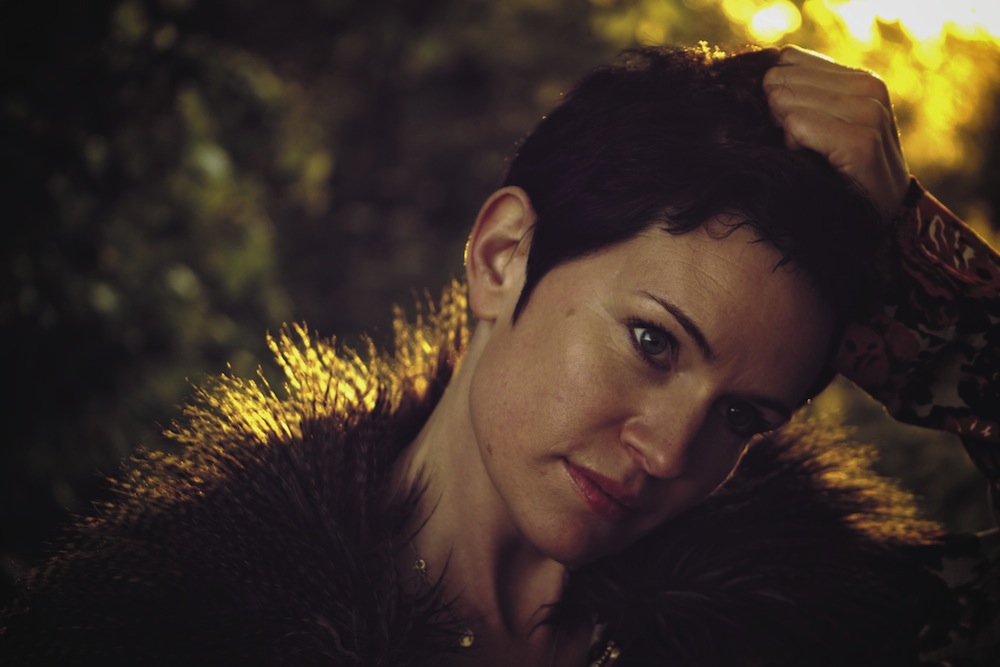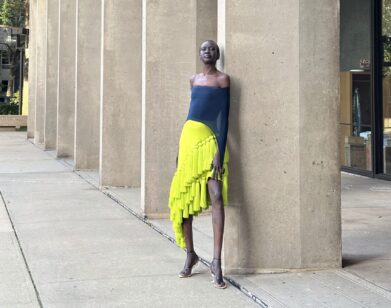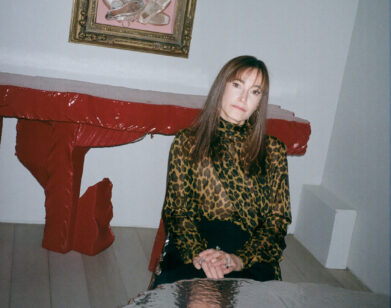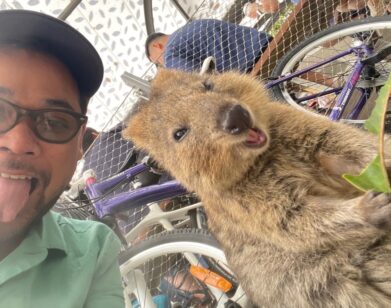Wolf Hall

ABOVE: SARAH HALL. PHOTO COURTESY OF RICHARD THWAITES.
“I was useless at science. I was never going to be an astrophysicist,” dead pans acclaimed British writer Sarah Hall. “Language I find easy,” she continues. “Language description and metaphors seem readily available. The things I have to work harder at are plot, pacing, and form.”
Hall’s prose is rhythmic and sensual, especially when she describes the wilds of her native Cumbria in the North West of England. Her six books thus far (including a short story collection) have fittingly earned her a Commonwealth Writers Prize, two Man Booker Prize listings, and a BBC National Short Story Award.
The Wolf Border, Hall’s newest novel out this week, is also set in the wet, windswept Lake District. Its main protagonist is Rachel Caine who has been shunned by her family for a decade, choosing to live in Idaho as part of a wildlife recovery program. A loner with an airport carousel of emotional baggage, she decides to move back to England after an unwanted pregnancy coincides with an odd offer from The Earl of Annerdale, a wealthy landowner and politician with a passion for breeding wolves. In addition to having to confront her fractious relationship with her family, Rachel discovers that the Earl—an odd, elusive character—his family members, and the loyal staff who inhabit his vast estate may not be who she initially thought. There’s a touch gothic: shadowy figures in the woodland, animal natures unleashed, and a dark family secret concerning a dead mother and estranged son.
JEFF VASISHTA: The obvious question first. Why wolves?
SARAH HALL: Wolves have always been a bit of a pre-occupation but it was only in the last few years when I was researching the novel that the general interest I had about them came in to play. Then I really started getting into it. I went to the wolf center in Reading and talked to an expert.
VASISHTA: There’s a ton of wolf info in here. Was it difficult to stop this becoming a too wolf fact heavy?
HALL: Definitely. The first few drafts, there was too much wolf information in there. First drafts are very accommodating that way. I did become a tedious dinner guest because I’d just be jabbering on about wolves. They are fascinating creatures. So good at what they do. You write a book about wolves and you have inherent drama in there just because they are what they are.
VASISHTA: Wilderness novels and memoirs seem to be all the rage in the U.K. at the moment. I’m thinking about H Is For Hawk by Helen Macdonald and Robert MacFarlane’s Landmarks. Why do you think that is?
HALL: There are definitely prominent people who are writing about it and making it interesting for people in the city. I wonder if that’s part of the appeal—that rural politics aren’t being taken into account. We’re losing our wild spaces. There’s a focus on house-building, and popular science has entered into the discussion in the media as well with talk of the ecology and rewilding in a way that it hasn’t before. We don’t have the kind of wilderness they have in North America—only perhaps in the [Scottish] Highlands. There is a sense that what we’ve got should be looked after because it will be denuded more and more until something’s actively done. The forestry commission doesn’t seem to have much power. It’s not about nostalgia and the bucolic and pastoral, it’s about a healthy future environment, and that includes biodiversity and apex predators.
VASISHTA: I was shocked to find out that wolves haven’t lived in the wild in England for 500 years. I suppose that’s what happens when you get your wolf education from An American Werewolf in London.
HALL: There’s a lot of talk about it here now. George Monbiot, who’s written for The Guardian, is a big campaigner and he’s written a book called Feral. There have been studies done that show the highlands Scotland would be good for three wolf packs. It would be good for the deer population and keep them in check. There’s talk about it but experts say the public wouldn’t be ready for it for about another 20 years. They’ve got to get their head around it. With a few positive campaigns you could accelerate that. I’d like to see it.
VASISHTA: If this novel was being made into a Hollywood film there are a lot of potential characters who could go on to greater evil, but you held back from turning them into movie-type villains.
HALL: I don’t like novels that tie everything up in a plot-y way. I always think that’s not really true of life, particularly of people in power. For all the Freedom of Information Act, there’s still an awful lot of murky stuff out there. Rachel suspects something’s going on, but to fully expose everything at the end would have been a bit too obvious and made the novel more superficial. I was going for naturalism and realism. There are little non-starter things like the man in the wolf mask. I think at one point Rachel’s a little suspicious that it could even be the Earl himself. There are a lot of things that remain under the surface because you’re never quite sure with the powers that be what they’re actually up to. I know I sound paranoid. You need a few mysteries stowed away there that keep you thinking. I know I like that as a reader and so I try to do it as a writer.
VASISHTA: In this novel, Scotland is independent from Britain and seems to be doing well and have its act together. They’ll be cheering you down the streets of Edinburgh when you go for a book event.
HALL: Yes, there has been quite a lot of good press in Scotland. A lot of journalists have been writing and saying it’s nice to see Scotland not portrayed negatively from an English person. Before the referendum it got quite bad. I don’t think the issue of independence is going away.
VASISHTA: The early part of the novel is set in Idaho and I know you lived in the States for a while. Any regrets about moving back?
HALL: That was my wild earlier life! I married an American. He was from the Pacific Northwest, but went to law school in the South so I was living in Virginia and North Carolina. He’s actually good friends with me and my current husband now. I never planned to stay forever. We were separating and it seemed the right thing to do to move back.
VASISHTA: How did your impending motherhood influence this novel if at all? Rachel is pregnant and then a new mother. Some of the most compelling scenes are when she’s tracking the wolves and has to take care of her baby at the same time.
HALL: I wrote the book before I had the baby. I finished the final round of editing the week before I had the baby and final proofs after the baby so I was able to put little bits of real life experience in there. There’s a balancing act between work and motherhood. As the mother of baby I know it’s a dilemma that loads of parents face—okay, tracking wolves is a little extreme! I loved Francis McDermott’s character in Fargo who is heavily pregnant. You just never see that in films or books when someone is heavily pregnant and they’re just getting on with their jobs.
VASISHTA: Rachel’s boyfriend, Alexander, is almost too good to be true. You’ll have a lot of girlfriends asking you if men like him actually exist.
HALL: He is lovely—but then there are quite a lot of lovely men out there. He’s a foil for Rachel because she’s knotty, cold at the center, and psychologically damaged. I wasn’t going to write a male version of her. I do think there are a lot of really nice men out there that demonstrate characteristics that could be described as traditionally feminine and then there are female characters that people think are masculine. I wanted to give her a nice boyfriend. She’d come back home and had trouble with her mum. I’ve got this notion that all vets are slightly heroic. I guess it’s from being brought up in the Lake District.
THE WOLF BORDER IS OUT TODAY, JUNE 9, VIA HARPER.






